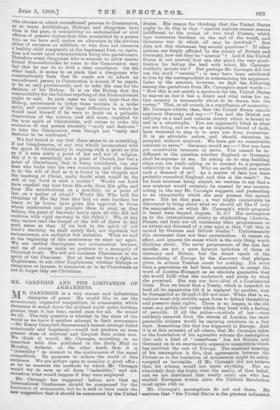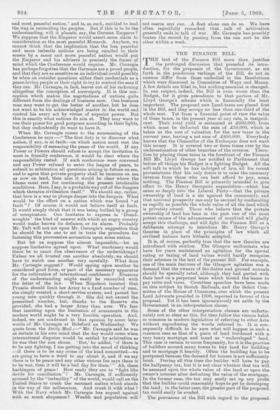MR. CARNEGIE AND THE LIMITATION OF AR1VIAMEN TS.
MR. CARNEGIE is a very sincere and industrious champion of peace. He would like to see the monstrously expensive competition in armaments, which threatens to weigh down the civilised world under burdens greater than it can bear, ended once for all. So would We all. The only question is whether in the state of the world as we know it another attempt to limit armaments —Sir Henry Campbell-Bannerman's honest attempt failed notoriously and hopelessly—would not produce an even greater state of mistrust and disquiet than exists now. We think it would, Mr. Carnegie, according to an interview with him published in the Daily Mail on Monday, declares, on the other hand, that it is " imbecility " to consent to the continuance of the naval competition. He proposes to relieve the world of this nuisance. We are always open to consider a good offer ; so let us examine the methods by which Mr. Carnegie would try to save us all from "imbecility," and ask ourselves what would happen if they were employed. Mr. Carnegie has suggested before now that an International Conference should be summoned for the limitation of armaments, but he is said to have made the new suggestion that it should be summoned by the United States. His reason for thinking that the United States ought to do this is that "neutral nations cannot remain indifferent to the action of two rival Powers, which lays enormous burdens on the rest of the world, and threatens war in which all may be involved." But does not this statement beg several questions ? If other nations are deeply affected by the rivalry of Britain and Germany, how can they be " neutral " ? And if the -United States is not neutral, how can she plead • the very quali- fication for taking the lead with which Mr. Carnegie dutifully invests her P But perhaps Mr. Carnegie did not use the word " neutral " ; it may have been attributed to him by the correspondent in summarising his argument. Later in the account, however, we find the following among the quotations from Mr. Carnegie's exact words :— "Now this is not merely a spectacle for the United States to marvel at, but it has a direct and vital value for us. Our country is necessarily about to be drawn into the vortex." That, at all events, is a repudiation of neutrality. Mr. Carnegie admits, then, that the United States cannot approach Germany and say :—" You and the British are carrying on a mad and ruinous rivalry which is bound to end in a catastrophe. You are apparently blind to what you are doing, and so we, as an impartial friend of both, have ventured to stop in to save you from yourselves. It is an altruistic action, and should, therefore, be accepted without mistrust. We have got no conceivable interests to serve." Germany would say :—" But you have got conceivable interests to serve. You cannot be in- different to the question whether England or Germany shall be supreme at sea. In asking us to stop building ships you are really asking us to consent to a perpetual inferiority in the world. Why on earth should you make such a demand of us ? As a matter of fact, you have probably consulted England, and this is the result." So far from mistrust being abated, we venture to say that a new mistrust would certainly be created by any country acting iu the way Mr. Carnegie suggests, and pretending to an impartiality which she may possess but cannot prove. But let that pass ; a way might conceivably be discovered to bring about what we should all like if only the assumption on which Mr. Carnegie's whole proposal is based were beyond dispute. Is it ? His assumption as to the international rivalry in shipbuilding (Austria, France, and Italy are all increasing their programmes to an extent not dreamed of a year ago) is that "all this is caused by German and British rivalry." Unfortunately this statement does not bear examination. It names an effect, and ignores the cause which is the only thing worth thinking about. The naval programmes of the last few months are not a mere fatuous imitation of those of Germany and Britain, but the direct result of the demoralising of Europe by the discovery that pledges given in solemn Treaties count for nothing. For more than a generation we had been accustomed to accept the word of Austria-Hungary as an absolute guarantee that she would fulfil what she undertook and abide by what she promised. She was our beau-ideal of a Continental State. Now we know that a Treaty, which is intended to bind all its signatories till it is replaced by another, may be disregarded as though it did not exist. While that is so, nations must rely entirely upon force to defend themselves and preserve their rights. There is no longer, in the old sense, any public law under which they lived with a feeling of security. If all the police—symbols of law—were suddenly removed from the streets of London, the most peaceable citizens would be carrying revolvers in a few days. Something like that has happened in Europe. And it is at this moment, of all others, that Mr. Carnegie takes as the foundation of his agreeable scheme the assumption that only a kind of " cussedness " has led Britain and Germany on in an enormously expensive competition which has involved the rest of Europe. The essential meaning of his assumption is this, that agreements between the Powers as to the limitation of armaments might be safely accepted as inviolable. If Mr. Carnegie did not believe that, his scheme would not mean anything. But we absolutely deny the truth, even the sanity, of that belief, and we are convinced that nearly every one who has studied European events since the Turkish Revolution must agree with us.
Mr. Carnegie's assumptions do not end there. He assumes that "the United States is the greatest industrial, and most peaceful nation," and is, as such, entitled to lead the way in reconciling the peoples. But if this is to be the understanding, will it placate, say, the German Emperor ? We suppose that the Emperor would assert some claim to consideration as the most peaceful Monarch. Anyhow, we cannot think that the implication that the less peaceful and more imbecile nations are being recalled to their senses by a saner and more peaceful nation would put the Emperor and his advisers in precisely the frame of mind which the Conference would require. Mr. Carnegie has perhaps forgotten that the Germans are a proud people, and that they are as sensitive as an individual could possibly be when an outsider questions either their credentials as a peace-loving people or their right to try to control the seas if they can. Mr. Carnegie, in fact, leaves out of his reckoning altogether the conception of sovereignty. It is this con- ception which makes the negotiations of nations quite different from the dealings of business men. One business man may want to get the better of another, but he does not want to be his acknowledged master in the world and control his every act by virtue of superior power. But this is exactly what nations do aim at. They may want to use their power for good purposes according to their lights, but they undoubtedly do want to have it.
When Mr. Carnegie comes to the summoning of the Conference he says :—" The first duty is to discover what nation, if any, is at fault—on which nation must rest the responsibility of menacing the peace of the world. If any Power or Powers should refuse to accept the invitation to meet in friendly conference, it would be clear where the responsibility rested. If such conference were convened and any Power refused to enter the league of peace, to submit to arbitration all questions arising in future on sea, and to agree that private property shall be immune on sea as now on land, then also it would be clear where the blame must rest for continuing the present intolerable conditions. Here, [say, is a. probable way out of the dangers which threaten civilisation itself." We should say, rather, that here is a way to plunge deeper into the dangers. What would be the effect on a nation which was found "at fault " ? Of course it would not believe itself at fault. It would simply think that it was being bullied by a group of conspirators. One hesitates to express 'Dread- noughts' the kind of answer with which an angry country would make known its defiance, or its alarm. Probably Mr. Taft will not act upon Mr. Carnegie's suggestion that he should be the one to sot in train the procedure for fastening this provocative accusation upon some nation.
But let us suppose the almost impossible,—let us suppose limitation agreed upon. What machinery would there be to exact due observance of the undertakings ? Unless we all trusted one another absolutely, we should have to watch one another very carefully. What does Mr. Carnegie suggest ? Would spying upon another be considered good form, or part of the necessary apparatus for the cultivation of international confidence ? Evasions of the understanding might easily be reconciled with the letter of the law. When Napoleon insisted that Prussia should limit her Army to a fixed number of men, she simply created a short-service system, and passed her young men quickly through it. She did not exceed the prescribed number, but, thanks to the Reserve she provided, she had a larger Army than ever. We fear that insisting upon the limitation of armaments in the modern world might be a very forcible operation. And, indeed, we are confirmed in that opinion by some later words of Mr. Carnegie at Bideford on Wednesday. We quote from the Daily Mail:—" Mr. Carnegie said he was as certain in his own mind that the day would come when international disputes would be settled by arbitration as lie was that the sun shone. 'But,' he added, 'if there is to be any fighting, I am getting into the mood of thinking —if there is to be any crime of the kind committed—we are going to have a word to say about it, and if we say there is to be peace and any other vicious foe says there is to be war, then it will be a bad day for them.'" Ah, these harbingers of peace ! How ready they are to "fight like devils for conciliation " ! Mr. Carnegie, if sufficiently aroused by the "imbecility" of the world, would call on the United States to crush the recusant nation which stands in the way of the millennium. And crush it with what ? With the Navy which Mr. Carnegie has argued against with so much eloquence ? Wealth and population will not coerce any one. A fleet alone can do so. We have often regretfully remarked that talk of arbitration generally ends in talk of war. Mr. Carnegie has possibly beaten the record by passing from the one sort to the other within a, week.











































 Previous page
Previous page